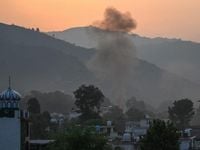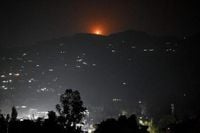On May 7, 2025, tensions between India and Pakistan escalated dramatically following a series of airstrikes and military engagements that left at least eight civilians dead and 35 injured in Pakistan. The situation unfolded early in the morning when the Indian military initiated what it termed a "major military operation" targeting nine locations in Pakistan, which it claimed were associated with terrorist activities.
According to the Pakistan military's director, Chaudhry, in a televised address, the Indian Air Force launched missiles from its airspace into various regions of Pakistan, including Bahawalpur, Sialkot, Sheikhupura, and Muzaffarabad. The strikes reportedly destroyed several mosques and civilian buildings, leading to significant casualties, including the death of a child. Eyewitnesses in the affected areas described hearing loud explosions, followed by power outages, particularly in Muzaffarabad.
Pakistan's Defense Minister, Ashraf, announced that in retaliation, the Pakistani Air Force successfully shot down five Indian military aircraft, including three Rafale fighters, one Su-30, and one MiG-29. All Pakistani aircraft returned safely, and the military claimed that the downed aircraft were hit within Indian airspace, emphasizing that Pakistan suffered no losses of its own aircraft.
In response to the escalating conflict, Pakistan's Civil Aviation Authority announced the immediate closure of its airspace for 48 hours, affecting major international airports in Islamabad, Lahore, and Karachi. This decision came alongside the cancellation of all flights at Islamabad International Airport. Additionally, the Punjab provincial government ordered the closure of all educational institutions.
Prime Minister Shabaz of Pakistan condemned India's airstrikes, asserting that Pakistan has the right to respond to what he called acts of war. He stated, "We will retaliate at the time of our choosing," referring to the military's preparedness to respond to the provocations from India.
India, on the other hand, defended its actions, stating that the strikes were aimed at terrorist infrastructure and were conducted with precision. The Indian government described the operation, termed "Operation Sindoor," as targeted and responsible, asserting that no civilian or military facilities in Pakistan were harmed. According to Indian media reports, the strikes resulted in the deaths of 12 individuals associated with terrorist groups and left 55 others injured.
The backdrop to this current escalation includes a recent shooting incident on April 22, 2025, in Indian-administered Kashmir that killed 26 people, prompting both nations to adopt aggressive postures. Following that incident, India imposed a ban on all imports from Pakistan, while Pakistan retaliated by banning the transit of goods from India.
Adding to the tensions, reports indicated that India had cut off water flow to the Chenab River's Baglihar Dam and planned similar measures at the Kishenganga Dam on the Jhelum River. These actions have raised concerns about water security in Pakistan, further complicating the already fraught relationship.
On May 5, 2025, exchanges of gunfire resumed along the Line of Control in Kashmir, with both sides accusing each other of initiating hostilities. Indian military officials reported that Pakistani troops had opened fire on Indian positions, while Pakistan claimed that Indian forces were responsible for indiscriminate shelling that resulted in civilian casualties on its side of the border.
The international community has been closely monitoring the situation. U.S. President Trump expressed disappointment over the recent violence and hoped for a swift resolution to the conflict. He noted, "From the history of both countries, we know this was bound to happen sooner or later. I hope this conflict can end quickly."
Senator Marco Rubio also commented on the situation, stating that he was closely watching the developments and hoped for peace between the two nuclear-armed nations. The ongoing conflict raises serious concerns about regional stability, given both countries' nuclear capabilities.
As the situation continues to evolve, both India and Pakistan remain on high alert, with military forces mobilized along the border. The potential for further escalation looms large, and the humanitarian impact of the conflict is already being felt by civilians caught in the crossfire.
With the world watching, the need for diplomatic dialogue and conflict resolution has never been more urgent. The international community is calling for restraint and a return to negotiations to prevent further loss of life and to address the underlying issues fueling the longstanding conflict between India and Pakistan.



